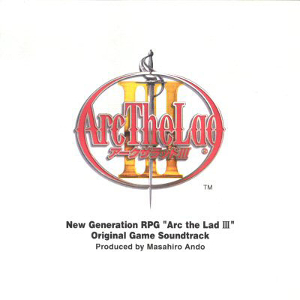Arc the Lad III Original Soundtrack
 |
Album Title: Arc the Lad III Original Soundtrack |
| Record Label: Village Records |
|
| Catalog No.: VRCH-5002 (1st Edition); VRCH-4004 (2nd Edition) |
|
| Release Date: January 13, 2000; February 7, 2001 |
|
| Purchase: Buy Used Copy |
Overview
Towards the end of the PlayStation era, a third game in the Arc the Lad series was produced. The last score in the series to be scored by Masahiro Andoh, the artist put considerably more effort into this album than its predecessors, offering some new directions and a greater quantity and quality of material.
Body
In series’ tradition, the soundtrack opens with a heroic orchestration of “Theme of Arc the Lad”, which transiently impresses but is too brief to be a major selling point. Masahiro Andoh makes a clearer effort to build on these orchestral origins compared to earlier soundtracks in the series using a surprisingly high quality palette. Written in the style of Final Fantasy series, “Sasha Village” blends a pensive woodwind melody against classically-oriented strings to emotional effect. “Port Town Reno” takes a light march-like approach to reflect a more expansive but still light-hearted setting, whereas “Academy” impresses with its Baroque stylings and bold development. These compositions are rather derivative, but they are fully-fleshed, appropriate, likeable, and memorable.
Masahiro Andoh, in collaboration with various arrangers, brings plenty of emotion to the synthetic orchestral compositions on the soundtrack. The likes of “Area Change”, “Testa”, and “Item’s Association” show that fun music can be written in a sophisticated way, with lots of frivolous classical phrasing and bouncy pizzicato figures. The transformation compared with Arc the Lad‘s 20 second loops is impressive. Battle themes such as “Battle 4” with its tragic melody and brutal discords or “Last Battle” with its slow-building ambient development demonstrate orchestral writing of a very different kind. With richer timbres and development, these tracks make a much greater impact in context than counterpoints from previous titles and are enjoyable on a stand-alone level too.
Despite the orchestral focus, there are a range of contrasting tracks. An example is “Alec’s Theme” with its blend of vibrant trumpet melodies and electrifying synth arpeggios. It’s a fine iconic depiction of the new protagonist. There are also some battle themes tinged with contemporary elements, such as “Battle 1” and “Battle 3”, though they are quite well-integrated with the soundtrack as a whole. Although apparently Masahiro Andoh’s speciality, the more jazzy tracks like “Weapon’s Association”, “Guild”, and “Sheryl’s Theme” are once again tacky and bland. These are among the considerable number of filler tracks that populate the 59 track score, but fortunately do not overwhelm like in earlier scores in the series.
The soundtrack ends with the Japanese and English versions of the vocal theme “Way to the Earth”. It’s a very typical ballad featuring a mature female voice interpreting suitably written lyrics above functional pop instrumentation. As with similarly styled ballads in Square’s RPG, it will either inspire strong emotions in listeners or alienate them with their sappiness. The soundtrack satisfyingly ends with an extended orchestration of the series’ main theme, featuring a new orchestration by Michiru Oshima and a rich orchestral performance. It’s not quite as impressive as the full version on Arc the Lad, but it is featured on a superior album overall.
Summary
The Arc the Lad III Original Soundtrack is a vast improvement on its two predecessors. Masahiro Andoh clearly put more effort into producing memorable and meaningful material here. With the help of various arrangers and sound designers, the music was elaborated upon to yield a conventional but impressive RPG score. The soundtrack does feature some filler and packs too many tracks on a single disc, but overall it’s a wholesome listen.
Do you agree with the review and score? Let us know in the comments below!
4
Posted on August 1, 2012 by Chris Greening. Last modified on January 22, 2016.














